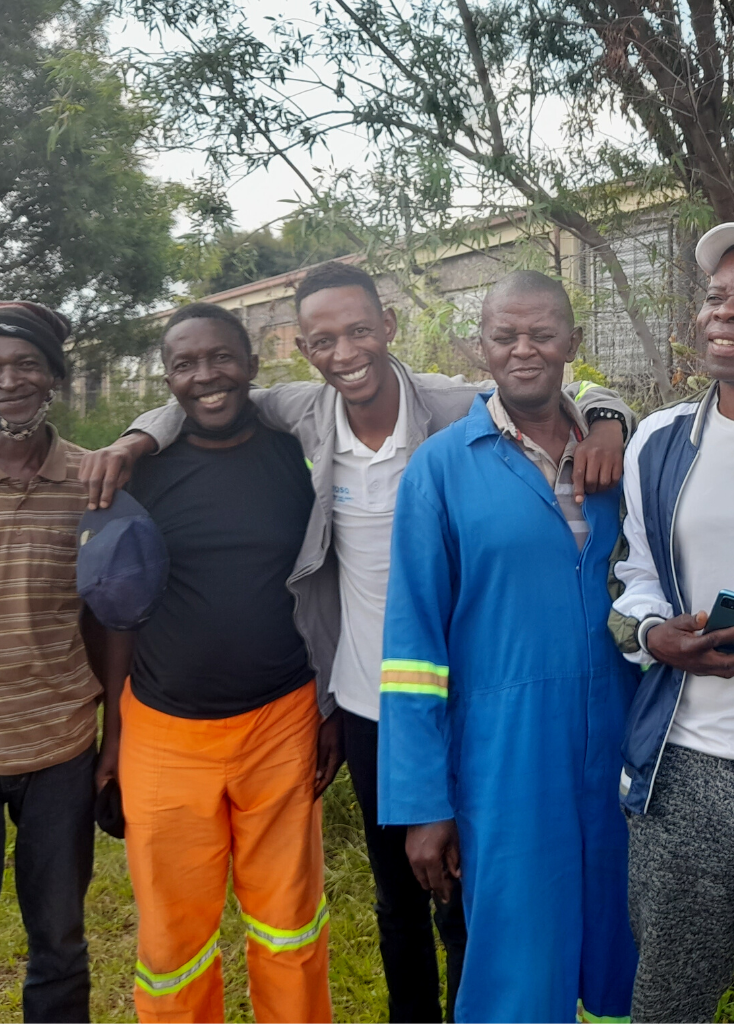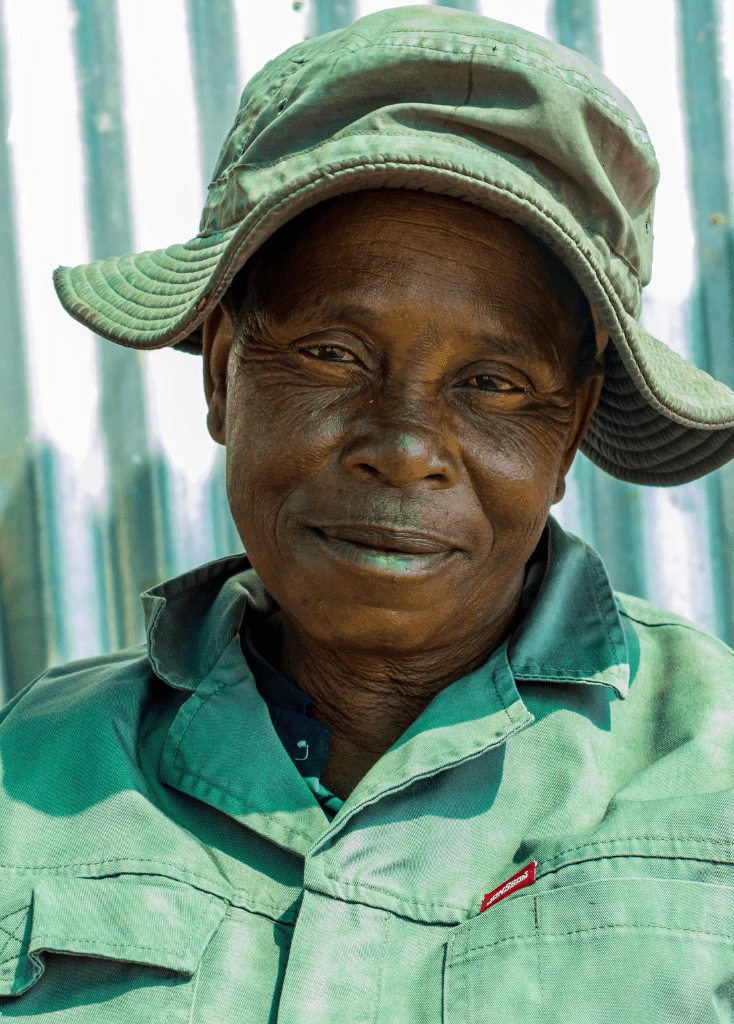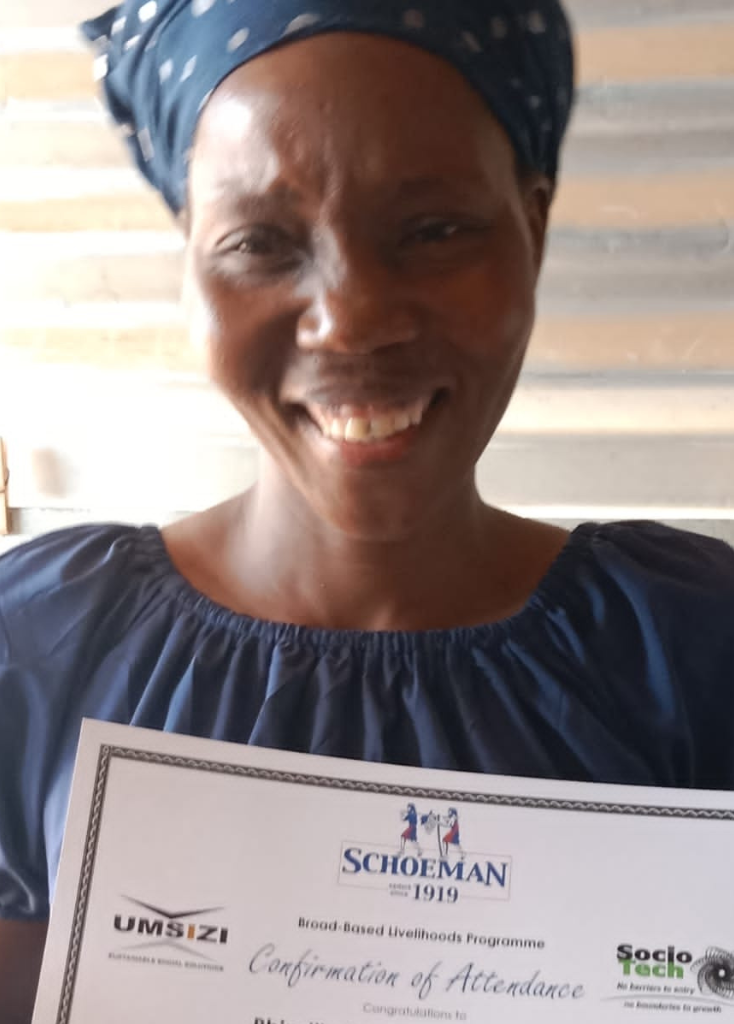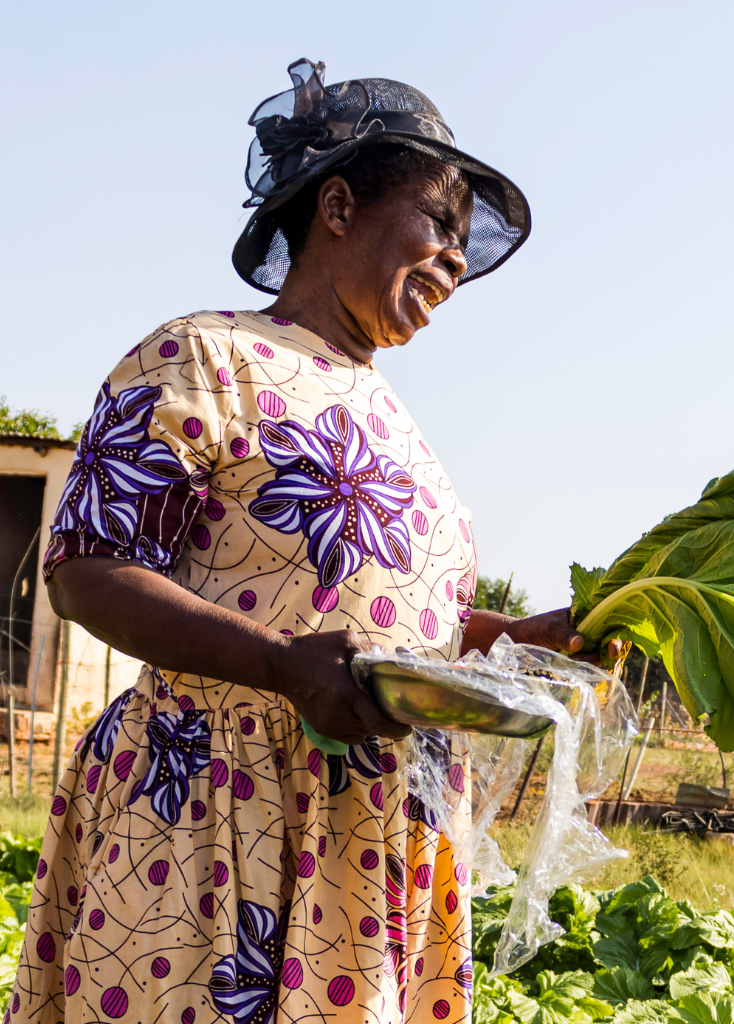
BBL PARTICIPANT: Pimville Farmers, Soweto, Gauteng
In a Nutshell
Through their participation in SocioTech’s Broad-Based Livelihoods (BBL) strategies to stimulate personal economic activity, the Pimville Farmers from Soweto discovered shared values and aspirations, and respectfully crafted a mutually supportive alliance. Through their BBL Circle of Friends, they support each other with knowledge sharing, and pull together when hard work is needed in their respective gardens.
Their plan is to jointly fill big orders for large customers. They also share a passion to help youth to discover the power of self-reliance so that they too can carve out their own independent and successful futures.
They say…
WHO WE ARE
Oupa Ramaila: “Pimville Farmers is made up of seven men. We work as a team but we are not a registered cooperative. We all did the same SocioTech BBL MyFood training session in 2021. Some of us knew each other before that and others not, but through that course we discovered that we have similar outlooks on life and shared goals.”
Dumisani Luvuno: “We lease and work across 3 school garden plots in the Pimville area and since doing the SocioTech course we farm in very similar ways so our needs are similar. It makes sense for us to work as a unit to support each other. So, that is what we do.”
Arnold Masuku: “What happens is that we come together to assist each other with the hard work stages that require significant labour. Things like digging trenches or collecting bones and cans. We have also come up with a plan to share resources like tools and use our brains together to deal with problems like pests.”
Albert Nkutha: “And, hopefully, working together will allow us to fill big orders for large customers.”
Sizwe Mahlambi: “Each of us wishes for a piece of land and peace of mind. We all have that dream of land we can live off, but we see that together we are stronger and more able to move forward towards that dream.”
WHAT MAKES OUR TEAM WORK WELL?
Wandile Madibane: “I think the arrangement works well because we have a shared understanding of how to behave and treat each other. We are careful to go forward with respect at all times. Respect for what we do and the people we do it with. Respect for the earth and the plants we work with. That is what we are all about.”
Oupa: “Group dynamics (in any sphere of life) are complicated, but I think the fact that we all bring distinct skills and distinct life experiences, but a shared love of farming, helps a lot. We value every contribution. We see that together we are a stronger team than any of us would be alone. There is a generous willingness to share knowledge and skills between us – for instance, this man (points to Albert Nkutha) he is my professor. Our plant leader. Each time I am with him, I learn something from him.”
Sizwe: “We don’t step on each other’s toes. We address each other respectfully. We recognize each individual and each position.”
Albert: “We have a shared passion for farming. We were all food gardening long before we formed this group. Most of us had been farming since childhood. It is something that we think of first thing in the morning and last thing at night. I think if we were suddenly all millionaires tomorrow we would all still be gardening. Watching those seedlings is in our souls and we recognize that quality in each other. That is why our alliance works so well.”
Oupa: “I think another thing that holds us together is our shared interest in seeing this community work. There are lots of problems in this area but there is also a lot of potential. In our own capacities we each of us gives our time and our skills to supporting various groups and schools in our area. In most cases that is how we met. We were all doing those things long before we decided to join forces and it is part of how we see our work going forward. Helping others is part of who we are.”
Dumisani: “We are also all greedy for knowledge and eager to learn. The more you learn, the more you produce and the more you produce the more you can help others. Like the birds for instance – we are all very aware of how much we are losing to them. Early in the morning and in the late afternoon especially. I think they wait for us to go home and then they strike. We are all wanting to learn more about how to control that issue as a matter of urgency. The other area I want to learn about is natural pest control. And natural soil improvers. Green manure. Fermented black jacks and so forth.”
Arnold: “I think we also have a similar attitude to work. It is all about looking at what we have and not what we don’t have. For instance - the schools have also been very generous to us. Thanks to them we have very low overhead costs. We have been given a lot of tins from the school feeding scheme which will improve our trenches. Those are all blessings. There is a potential to make profits with this set-up”
"Helping others is part of who we are. "

WE WANT TO BE INVOLVED IN EDUCATING THE YOUTH OF PIMVILLE; about farming, about business, about God.
Albert: “If everything goes according to plan, so that in five years’ time we all have places of our own and flourishing farming businesses, I would still see this school garden place as a training farm to build the kind of knowledge and behaviour we need to see in the next generation. Not just farming knowledge but more general knowledge about life can come from working in a food garden. “
Learning about business
Oupa: “Like I said, there is a shared commitment to community development amongst us. Being on the school grounds is part of that giving back ethos. We need to educate children to believe that they can shape and control their own lives but they need to understand that to do so requires hard work, commitment and patience. Farming is a very clear example that if you put in the work, you can sustain yourself. They don’t understand that, these youngsters. They want to earn quick money in a job. They don’t think of sustaining themselves through business that they start themselves. They don’t understand this yet, but we are working on a plan. I see this as a place of training. The teachers are very open to that idea.”
Albert: “Even if the students don’t stay in farming, the skills they could learn in a food garden would help them learn about doing business. I still remember my pride the first time I sold vegetables that I had grown myself. I grew up in Daggakraal, Mpumalanga and I don’t remember a time before I had my own vegetable patch. By the time I was 12, it was doing so well that a local shop owner (Mr Sangweni – we all called him Sportsman because he loved sport) who was the richest man I knew, came to my parents and said “I want to buy this little boy’s entire crop.” Before it was even ready to harvest, I had sold the lot. Of course all the money went to my parents, but I was so proud to helping my family.”
Learning about God’s love
Sizwe: “Working with vegetables is also a way for the children to discover God’s love. When I was a child, I grew up with my grand-mother and she gave me a few bean seeds to garden with, but I threw them away. But the amazing thing was that they grew anyway and my grandmother said to me: “You see. Look at that. It is growing even though you threw it away.” And I was really inspired by that. I see that as a sign of God’s love. He never throws us away. That is a message that all our children need to hear.”
Learning how to manage mental health
Wandile: “My dad taught me that gardens are sensitive to emotions. If you come to the garden angry, the plants can tell. They are like children. If you approach them in anger they wither and die. That feeling that the plants can feel your feelings puts control into what you do. You can’t give in to negative emotions while you are working with plants.”
Sizwe: “Gardening is like medicine. It heals troubled minds. You don’t take your distress into that space. In a complicated world, it makes structure.”
FUTURE PLANS
Oupa: Like Mr Masuku said, it is all about seeing what we have; not what we don’t have and using that to plot the way forward. There are a lot of possibilities here and a real potential to make good profits. The Soweto Hotel is right around the corner and they need flowers for the rooms and reception so we are looking into the possibility of cut flowers. Funeral services too.
Wandile: “Flowers and herbs are also important for health so perhaps that is something to explore. I remember as a child my grandmother planted flowers and herbs and when I was sick she would be straight into her garden searching for the right mix. She would mix it up and the taste was terrible, but it worked! That, I think, was my first inspiration and I think that same feeling is true for a lot of people round here. Beauty products too – oils with herbs in and the like. It also seems like we should be working with what comes to us free – there is thepe and other traditional plants all around this area. If we were picking it and drying it to sell as morogo, or even just turning it into green manure, that would be a good use of our resources.”
Arnold: “This group is quite new. It is just like a small child that must grow and, like any child, it will cry and even sometimes be full of nonsense but you know as a father what you hope for that child. We have all started this group as kids but our vision for maturation is there.“
(absent on the day: Vusi Nene).
"... it's all about seeing what you have; not what you don't have."









